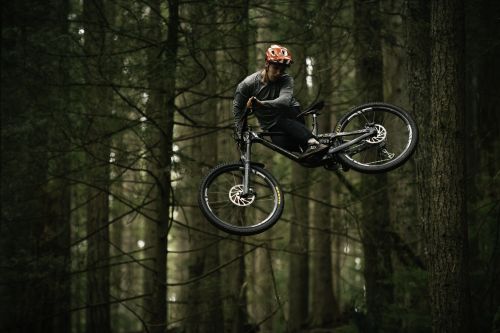A version of this article ran in the March edition of Bicycle Retailer & Industry News.
SEATTLE (BRAIN) — Kona Bicycles, cheerfully independent for a third of a century, is now part of an Ohio-based outdoor sports group, Kent Outdoors. For about a year, Kent, a long time family-run business, has been in the hands of Boston-based private equity firm, Seawall Capital.
It all sounds uncharacteristically corporate and buttoned-down for the Pacific Northwest brand. But Kona’s founders said they chose to accept the buyout offer in part because Kent and its CEO, Ken Meidell, appeared to get their brand’s quirkiness.
“There is a little weirdness with a lot of bike companies, Kona’s no exception; we like to think we have some quirkiness going on,” said co-founder Jake Heilbron. “That’s one thing we recognized right away with Ken. … Because you talk about a CEO and right away everybody thinks of someone in a power suit sitting in an office in Manhattan and Ken is pretty much the virtual opposite of that.”
Meidell, in fact, joined a video call with BRAIN and Heilbron from his home office in the Seattle area, wearing a navy hoody and a puffy jacket. Meidell is an outdoor industry veteran who has led brands including Dakine, Outdoor Research, and Cascade Designs. He’s also a lifelong cyclist who joined Moab, Utah’s Outerbike in 2019 as CEO, just before the pandemic shut down most of Outerbike's business. He joined Kent in 2020 and helped broker the sale of the family-owned business to Seawall. After the acquisition he became CEO of Kent.
(Kent Outdoors, by the way, has no connection to Kent International, the New Jersey-based bike company.)
For Kona’s partners — Heilbron, Dan Gerhard and Jimbo Holmstrom — some sort of transition was inevitable, Heilbron said.
“You can look at all the ways a transition can happen. … let’s say it is a family organization. What happens by the third or fourth generation to family businesses?” Heilbron asked. “Sometimes they are able to carry on, sometimes they are not. Sometimes they get sold to private equity, sometimes they get flipped around. What’s important is to ensure that the core of the company and the culture, while we are still here, is protected. If there is ever another transition, what will be appealing about Kent and Kona is the way the companies are run and the people who are in them. It’s not just about the numbers, it’s about the people.”
He said he, Holmstrom, and Gerhard plan to stay with the brand indefinitely and have acquired shares in Kent that gives them a vested interest in its success.
Meidell said Seawall has no specific timeframe for Kona and Kent Outdoors, although he acknowledged that private equity groups nearly always sell companies eventually. BRAIN’s question was: When?
“I’ve asked them (Seawall) the same question. Their answer is, ‘we don’t hard-target the exit, we sort of grow these businesses.’ They are really interested in growth, not in harvesting or selling off businesses, that’s not really the plan. The plan is these businesses are going to grow, and that’s not an unreasonable expectation,” Meidell said.
He said growth and profitability is the best way to protect Kona’s culture.
“If a business achieves a certain amount of scale and success, any change in the future is not going to involve a massive change in the way we do things,” he said. “We think that’s the right model: keep that going because that’s working.”
He said Kona’s reputation for making quality bikes — along with its quirkiness — gives the brand permission in the eyes of consumers to branch out into new product categories. Indeed, once known primarily for its mountain bikes, Kona has evolved to be a force in urban bikes, e-bikes, and in other areas over the years.
“I don’t feel like it’s a losing strategy (that) the Big Three are creating their own dealer networks. I think it’s just the opposite" — Jake Heilbron
Heilbron said he and the other partners have intentionally kept Kona small and limited growth, although the bike boom has accelerated growth. He said Kona can continue the recent growth in coming years by taking marketshare in IBDs and by expanding its product line. He said retailer acquisition by large brands like Trek, Specialized and Pon creates opportunities for remaining independent retailers and brands like Kona.
“I don’t feel like it’s a losing strategy (that) the Big Three are creating their own dealer networks. I think it’s just the opposite. It’s a great opportunity to add more dealers who maybe are a newer generation of retailers, that are enthusiastic about the sport and maybe have a little more business acumen. They come into the bicycle industry not just because they love bikes but also because they want it to be their livelihood and they want it to be a successful livelihood. I think there is a lot of alignment between those kinds of retailers and Kona,” he said.
On the day that Seawall announced the Kona acquisition, it also announced that it was changing the name of Kent Water Sports to Kent Outdoors. The company’s brand portfolio includes HO/Hyperlite, Connelly, O’Brien, Liquid Force, Onyx, Aquaglide, Barefoot/Fatsac and Arbor Snowboards.
Gerhard, Heilbron, and Holmstrom will remain with the company "in their familiar roles," the company said, and the headquarters and staff will continue.
Heilbron said he expects to be with the brand for many years to come.
“When I used to be an owner of Kona I used to say I have to retire when I can’t ride a bike anymore. I look at those people who are 100 and still ride everyday. I want to be that person. Obviously no one wants to talk with an old geezer about the latest thing in cycling but as long as I can contribute and I still get what bikes are all about I still want to be involved.”


